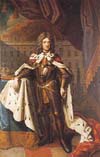Friedrich I.
|
 |
Friedrich was the second son of the great elector, Friedrich Wilhelm (1620-1688), by his first marriage with Luise Henriette, daughter of Friedrich Heinrich of Orange. He was born at Königsberg on 11 July 1657 and became heir to the throne of Brandenburg through the death of his elder brother, Karl Emil, in 1674. He became elector of Brandenburg in May 1688. At home and abroad he Friedrich continued the policy of his father. He was very fond of pomp, and, striving to model his court upon that of Louis XIV. (1638-1715), he directed his main energies towards obtaining the title of king. Despite the assistance he had given to the emperor, his efforts met with no success for some years; but towards 1700 the emperor Leopold I. (1640-1705), faced with the prospect of a new struggle with France, was inclined to view the idea more favorably. Having insisted upon various conditions, prominent among them being military aid for the approaching war, he gave imperial sanction to Friedrich's request in November 1700. The elector hurried immediately to Königsberg and with great ceremony crowned himself king of Prussia on 18 January 1701. True to his promise, the king sent help to the emperor; and during the War of the Spanish Succession the troops of Brandenburg-Prussia rendered great assistance to the allies, fighting with distinction at Blenheim and elsewhere. Friedrich, who was deformed through an injury to his spine, died on 25 February 1713. By his extravagance the king exhausted the treasure amassed by his father, burdened the country with heavy taxes, and reduced its finances to chaos. His constant obligations to the emperor drained Brandenburg of money which might have been employed more profitably at home, and prevented her sovereign from interfering in the politics of northern Europe. Friedrich, however, was not an unpopular ruler, and by making Prussia into a kingdom he undoubtedly advanced it several stages towards its future greatness. He founded the university of Halle and, at the urging of the great philosopher Gottfried Wilhelm Leibniz (1646-1716) who became its first president, the Berlin Society (later Academy) of Sciences.
Friedrich was married three times. His second wife was Sophie Charlotte (1668-1705), daughter of Ernst August (1629-1698) and Sophie (1630-1714), the first elector and electress of Brunswick - Lüneburg (Hanover). She was a close friend and philosophical correspondent of G. W. Leibniz.
![]()
Sources
- The Encyclopædia Britannica, 13th edition. New York: The Encyclopædia Britannica, Inc., 1926.
- Oxford Illustrated Encyclopedia. Ed. Harry Judge. New York: Oxford University Press, 1988.
Web





